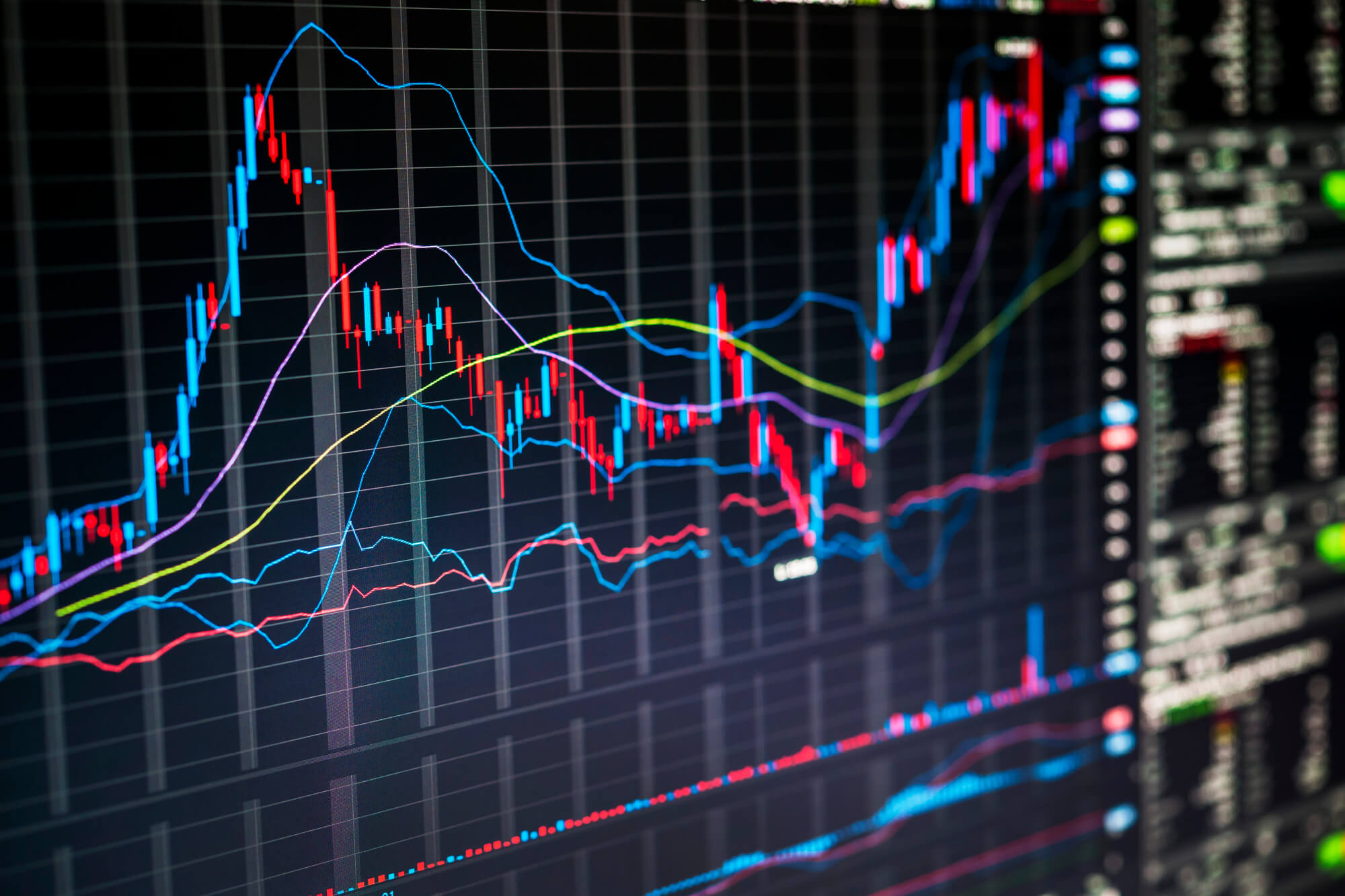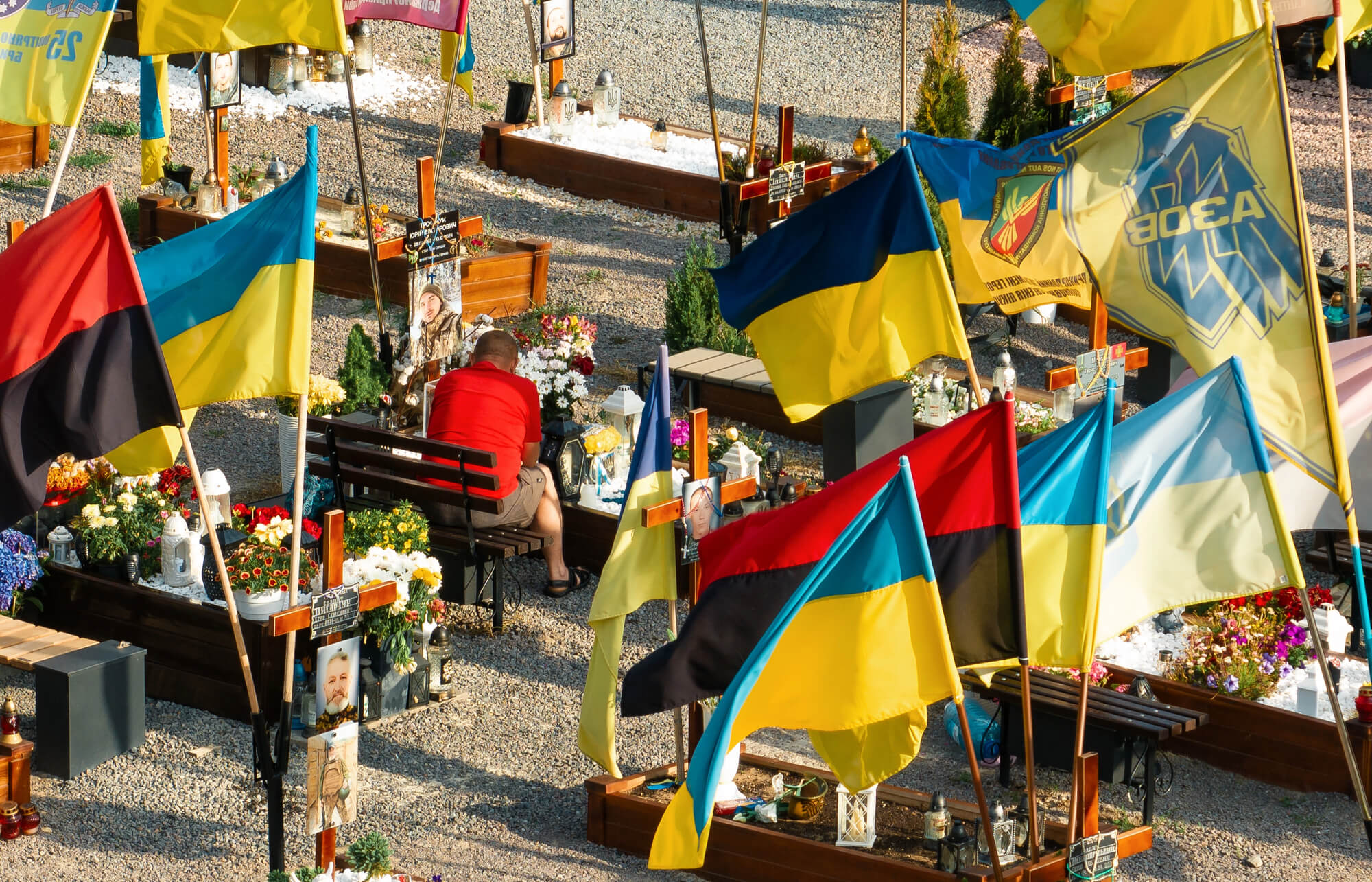The main reforms of the second quarter focused on education. Experts rated the introduction of individual educational trajectories for students and the recognition of English as a language of international communication in Ukraine the highest.
From now on, English will be mandatory at all stages of education, from preschools and daycare centers to universities. Public sector employees who regularly interact with foreigners will also be expected to have a command of the language.
Key changes
Among all the regulatory acts issued by the authorities from April to July, Reform Index experts selected 36 that have the potential to trigger long-term changes in the country. The vast majority of regulations received a +1 score from the experts, indicating not very significant but positive shifts. Against this backdrop, six events stand out, receiving +2 and +3 scores. These are considered the key reforms of the period. More details on them follow.
Chart 1. Distribution of regulations by the score received in the 2nd quarter of 2024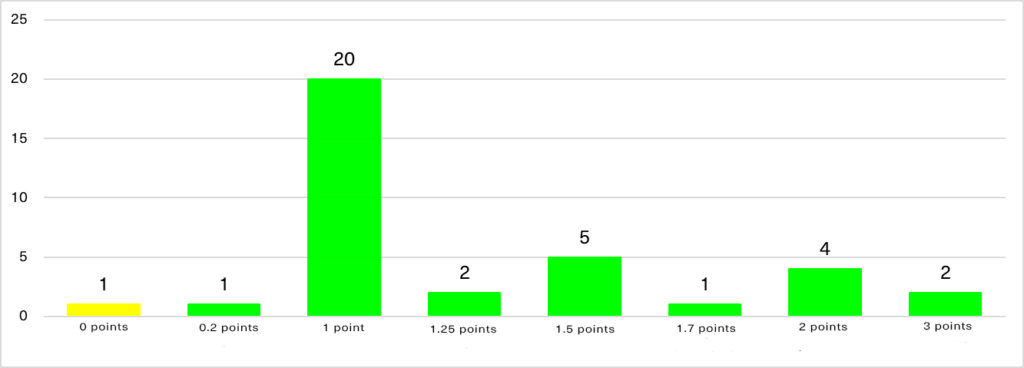
Source: Issues 236-241 of the Reform Index
All evaluations of regulatory acts by the Reform Index experts can be found at the following link.
The law on individual educational trajectories (+3 points) allows students to choose interdisciplinary programs, enabling them to decide on their specialty after completing the first year of study. Students are also permitted to shorten or extend the standard duration of their program by 25%. However, the permission to extend the duration will only take effect after the end of martial law to prevent the use of this provision as a means to avoid mobilization.
The law expanding the use of English in Ukraine (+3 points) grants it the status of a language of international communication in Ukraine. This means that the state will promote its learning at all levels of education, from preschool facilities to universities. English will become a mandatory subject and be included in the state final examinations for grades 9 and 11(12).
Proficiency in English will be required for all category “A” officials (such as heads of the secretariats of the Verkhovna Rada, the President, the Cabinet of Ministers, the Constitutional Court, and their deputies), certain category “B” and “C” officials (to be specified by the Cabinet of Ministers), as well as heads of local state administrations and their deputies, prosecutors, heads of state bodies and higher education institutions, and members of the supervisory boards of state-owned enterprises. This aims to enhance international cooperation in the public sector.
The law on basic military training in educational institutions (+2 points) establishes the rules for basic military training for Ukrainians, which will be conducted during the senior years of school (grades 10-12), vocational schools, and colleges in the “Defense of Ukraine” course. The law specifies that “no forms of discrimination, including gender-based discrimination, are allowed” during this training, meaning both boys and girls will study this subject equally.
The resolution regarding creating the Social Portal (+2 points) within the Unified Information System of the Social Sphere advances the digitalization of public services. By accessing the Electronic Dashboard of Social Services, users can remotely obtain information about social service conditions, apply for certain types of services (such as shelter for homeless individuals, self-care assistance, and support for families in crisis), and report people needing social support. The personal dashboard allows tracking of the status of requests.
The resolution granting 24/7 access to environmental information (+2 points) is a step towards establishing a comprehensive environmental monitoring system in Ukraine, covering air, water, soil, forest conditions, biodiversity, and waste management. Entrepreneurs will be able to submit environmental data required by the state through this system, and Ukrainians will have access to it via the “EcoSystem” platform. The platform is expected to be compatible with similar systems in European countries and help accurately calculate environmental damage from the Russian invasion.
The law on transparency of local self-government (+2 points) requires that local council meetings be recorded on video and made publicly available, allowing Ukrainians greater awareness of local government decisions. These recordings must be kept for at least five years. After the end of martial law, councils must establish live broadcasts of their meetings. The law also mandates that local council deputies and officials use the state language during meetings.
Progress by Reform Index areas
In the second quarter of 2024, reforms covered five of the six areas under observation. This time, there were no significant changes in the energy sector despite it being heavily affected by the war and likely needing new solutions and approaches. We also recorded only one event in the field of public finance — the state abolished both increasing and decreasing coefficients for radio frequency rent fees. These were difficult to administer and created inequality among enterprises in this market. Implementing a unified rent rate for all received the experts’ low but still positive rating of +0.2 points. We will provide more details about the three areas where most reforms occurred.
Graph 2. The sum of event scores by area, 2nd quarter of 2024
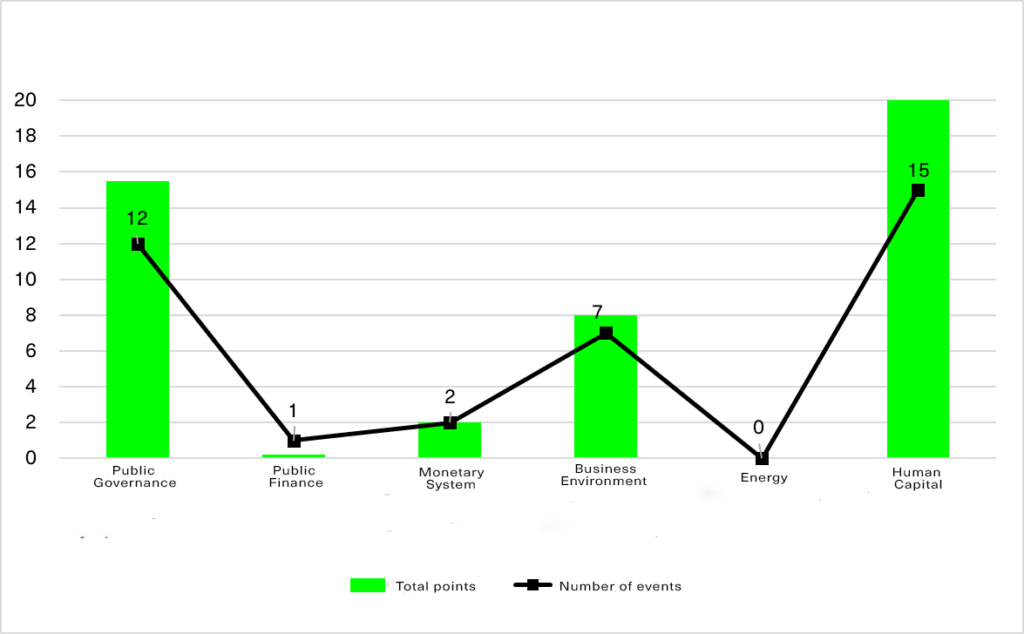 Source: Issues 236-241 of the Reform Index. Note: The total number of events in the chart is 37 because one event (the law on expanding the use of English in Ukraine) was classified under two directions simultaneously: “Public Governance” and “Human Capital.”
Source: Issues 236-241 of the Reform Index. Note: The total number of events in the chart is 37 because one event (the law on expanding the use of English in Ukraine) was classified under two directions simultaneously: “Public Governance” and “Human Capital.”
Human Capital
Over the three months, we recorded 15 significant changes in this sector, including the three major education reforms described above: the laws on the new status of the English language (also included in the “Public Governance” sector), individual educational trajectories, and basic military training.
A whole series of changes affected the healthcare sector. The possibilities for adding new medicines to the National Essential Medicines List (+1.75 points), which is used for state drug procurement, have been expanded. Medications included in the WHO Model List of Essential Medicines can now be added without state expertise if their active ingredient and dosage form are registered in Ukraine and at least four manufacturers produce them.
In the second quarter, a new educational level for doctors, residency (+1.25 points), was introduced in Ukraine. This is a postgraduate education stage following the internship. Most of the training will take place in hospitals, with only about 20% of the training time spent at the university. This year, the residency is available only for the specialty of “Neurosurgery,” but the list of specialties will be expanded next year.
The introduction of the Patient’s Dashboard on the Diia portal is expected to benefit patients (+1.5 points). In this section, patients will have access to their medical information stored in the Patient Registry. They will be able to see which other information systems have access to their data and terminate such access if needed. The platform will also allow patients to sign and terminate declarations with doctors.
The rules for undergoing medical and social examination have become more transparent (+1.5 points). The government established a clear list of documents required for submission to Medical and Social Expert Commissions (MSECs) for determining or reviewing disability. These documents include a passport, identification code, and military ID (registration certificate, military registration statement, etc.). Medical documents must include a referral to the commission, an extract from the medical record related to the individual’s illness or condition, test results confirming the diagnosis, a rehabilitation plan, documents proving the causal link to the disability, and documents confirming incapacity for work for four consecutive months.
Emergency doctors have been permitted to use telemedicine (+1.25 points). Now, in complex cases, the team can receive consultations from the senior doctor at the dispatch service and transmit data about the patient’s condition to the dispatcher. This is an important step towards providing higher-quality care to patients both at the call location and during transportation to the hospital.
Several changes have occurred in social protection and the labor market, each receiving a +1 point rating from the experts.
The law amending civil protection rules requires entrepreneurs to provide visitors (in places with large gatherings), students (in educational institutions), and patients (in hospitals) with access to collective protection measures (primarily referring to shelters in the context of the war with Russia).
The law on succession in labor relations introduces the automatic extension of collective agreements when a company changes ownership, allowing them to remain in effect until the end of their term, provided this period does not exceed one year.
There are plans to bring household helpers’ work out of the “shadow” economy. The state has defined what constitutes “domestic work” under the law: work performed regularly in a single household for over 40 hours a month. Lawmakers have specified that “waiting hours,” when workers cannot use their time at their discretion, are also considered working hours and must be paid. If a domestic worker lives in the employer’s home, they still have the right to manage their free time and take vacations at their discretion. Employers are prohibited from confiscating workers’ personal documents or infringing on their honor and dignity. To receive state protection, the worker must sign a labor contract with the employer. For encouragement, domestic workers are not required to pay the unified social contribution (USC); they can do so voluntarily.
The rules for pension accruals have been clarified for Ukrainians who were in occupied territories or abroad. Ukrainians currently abroad must undergo annual identification in person at the Pension Fund (PFU), via video communication, or through the electronic dashboard on the Pension Fund portal using the Diia ID. Ukrainians from Crimea must apply to the PFU with a statement confirming they are not receiving pensions from Russia to resume receiving their Ukrainian pensions.
Several pension accrual issues have also been clarified. If a person worked abroad in countries with which Ukraine has ratified agreements, their work experience will be counted automatically. If no agreements exist, the procedure for recognizing work experience will be determined by the Cabinet of Ministers. For residents of occupied territories, work experience will not be counted during periods of military service or voluntary positions held since February 19, 2014, in security forces, illegal authorities, or armed formations of the aggressor state.
Governance
In the second quarter, we recorded 12 significant changes in this sphere. Among these were the top reforms, including laws on the English language, transparent self-governance, resolutions on the social portal, and 24/7 access to environmental information.
During this period, the Verkhovna Rada expanded the powers of local self-governance by allowing communities to enter into inter-territorial and cross-border cooperation agreements (+1 point). Such cooperation can cover projects in economic, social, environmental, cultural, and other areas. The law aims to foster collaboration not only at the national level but also among individual territories and communities.
Local councils and administrations were granted powers to implement veteran policies (+1 point). Structural units dedicated to veteran affairs will be established in the regions, with the authority to grant war veteran status, recognize family members of fallen Defenders, and issue veteran certificates. These units will operate in addition to social protection bodies, which can also perform these functions.
Adopting a law enhancing the independence of the Economic Security Bureau (+1.5 points) was one of the structural benchmarks of Ukraine’s current cooperation program with the IMF. The law changes the rules for forming the selection commission for appointing the Bureau’s head: the number of commission members is reduced from 9 to 6, with three appointed on the recommendation of international partners. These international members will have a preferential vote: if four out of six commission members vote for the appointment, at least two of those votes must come from international experts. If three votes come from experts appointed by the Cabinet of Ministers and only one from an international expert, the decision will not be approved.
Independent evaluations of the ESB’s performance will be conducted one year and three years after their appointment to assess the effectiveness of the selected director. If the audit results are unsatisfactory, the director may be dismissed. To ensure the integrity of the Bureau’s employees, a one-time certification will be conducted within 1.5 years after the director’s appointment. Additionally, an internal control unit will be established within the Bureau to monitor the lifestyle of its employees and their compliance with anti-corruption laws.
Business Environment
This sphere saw seven reforms in the second quarter.
Two of these reforms directly facilitated Ukraine’s integration into the European common space. The resolution on the Integrated Border Management Center with the EU (+1 point) initiates the creation of a unified, round-the-clock coordination body that will bring together representatives of all services involved in border management (customs, border guard service, migration service, Security Service of Ukraine, Armed Forces, State Service on Food Safety and Consumer Protection, etc.). The establishment of such a center is mandated by EU Regulations, making it a necessary step in preparing for EU accession. The law on a single roaming zone with the European Union (+1.5 points) will enable Ukrainians in the EU and Europeans in Ukraine to use communication services within their paid package at regular rates without additional charges. These rules will come into effect on a date determined by the EU-Ukraine Association Committee in Trade Configuration (ACTC) after Ukraine implements the “Roam Like at Home” fair use policy regulations and the European Commission evaluates Ukraine’s legislation for compliance with European standards. The decision has not yet been made.
Two changes during this period concerned the biofuel market. Starting in May next year, a mandatory biofuel share of 5% in automotive gasoline will be introduced (+1 point). Exceptions are made for gasoline with an octane rating of 98 and above and fuel supplied to the state reserve or defense forces. With the increased use of biofuels, particularly biogas, the issue of customs clearance arose. The law on the customs clearance of biomethane (+1 point) stipulates that it will be processed under the same rules as natural gas. Currently, Ukraine has banned the export of natural gas to meet domestic needs, but the export of biomethane is allowed. Biomethane is more expensive than methane, providing a potential source of additional foreign currency revenue. To export, biomethane producers must be registered in the biomethane registry and connected to the pipeline using automated equipment that tracks gas accounting.
The Reform Index experts also positively evaluated the approval of the National Mine Action Strategy until 2033 (+1.5 points). The strategy‘s main goals are to clear territories of explosive ordnance for productive use, reduce the impact of explosive hazards on the lives of Ukrainians, and build a mine action management system. Along with the strategy, an implementation plan until 2028 was approved, containing over fifty measures. These include developing approaches to survey territories using technical and non-technical means, creating a registry of areas contaminated or potentially contaminated with explosive ordnance, studying the impact of explosive hazards on the national economy, certifying mechanized humanitarian demining equipment, and other critical steps.
Who is the biggest reformer?
In the second quarter of 2024, the Cabinet of Ministers once again became the leading reformer. The experts recognized as reformist five laws, two directives, and sixteen resolutions initiated by the Cabinet.
Parliament was responsible for nine reforms, while the President and individual Ministries (Health and Environmental Protection) each proposed one reform. It was the President who submitted the law on expanding the use of the English language to Parliament. The Ministry of Health introduced medical residency through its order, and the Environmental Ministry approved conditions for liability insurance for damage to protected areas.
Graph 3. Reform initiators in the 2nd quarter of 2024
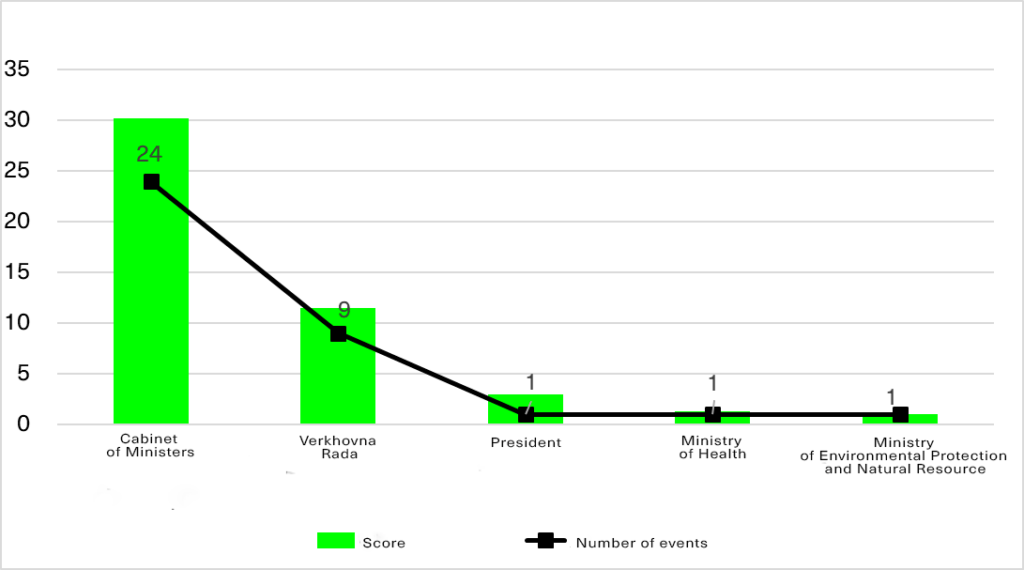 Source: Issue 236-241of the Reform Index
Source: Issue 236-241of the Reform Index
In the second quarter of 2024, compared to the previous quarter:
- The number of reforms slightly increased, from 33 to 36.
- The average round score remained low, at 0.76 points (0.69 points in Q1) on a scale from -5 to +5.
- The average score per event rose from 1.1 to 1.3 points.
Graph 4. Average quarterly value of the Reform Index
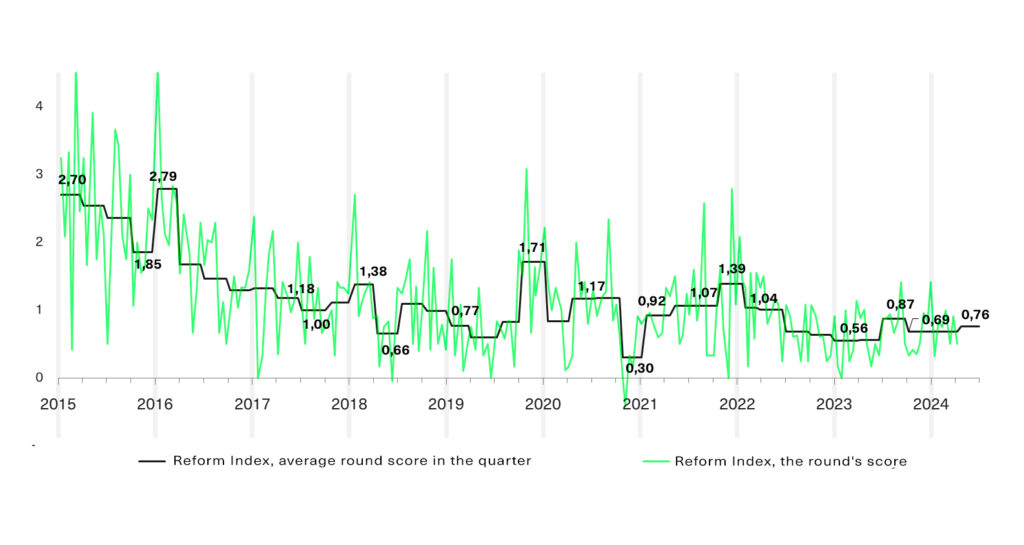
Source: Issues 1-241 of the Reform Index
Despite the ambitious task Ukraine faces in harmonizing its legislation with European standards—an effort that involves aligning approximately 27,000 regulatory acts in the agricultural sector alone—the pace of reforms in the second quarter was not very impressive. Reforms in the law enforcement sector, highlighted in the EU-2023 Review for implementation in 2024, also remain largely overlooked by parliamentarians. While there are still a few months left for these reforms to be adopted, it would be far more beneficial to see well-crafted, transparent, and thoroughly debated changes involving Ukrainian society rather than ending up with a “pig in a poke under the Christmas tree.”
Photo: depositphotos.com/ua
Attention
The author doesn`t work for, consult to, own shares in or receive funding from any company or organization that would benefit from this article, and have no relevant affiliations

